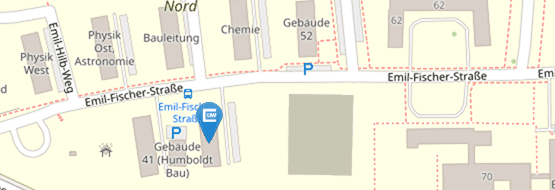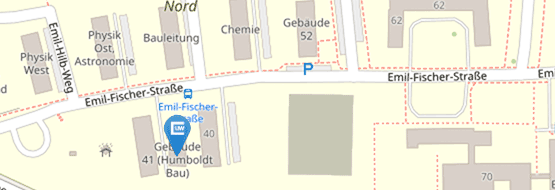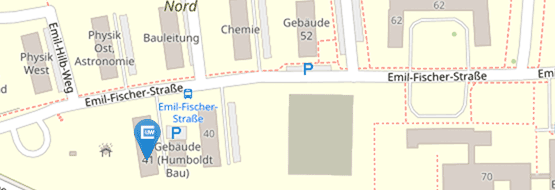Courses
Machine Learning with Graphs (Master Seminar)
Lecturers: Prof. Dr. Leon Bungert, Dr. Eloi Martinet
In this seminar we will discover machine learning methods that involve graphs. This includes partial differential equations on graphs and their use for semi-supervised machine learning, as well as graph neural networks for supervised learning with graph data. The seminar will cover theoretical and numerical aspects and can lead to a master's thesis in this topic.
For any questions, please feel free to contact leon.bungert@uni-wuerzburg.de. I look forward to your interest!
Wed 10-12 S0. 101
References:
[1] Calder, J., Cook, B., Thorpe, M., & Slepcev, D. (2020, November). Poisson learning: Graph based semi-supervised learning at very low label rates. In International Conference on Machine Learning (pp. 1306-1316). PMLR.
[2] Calder, J. (2018). The game theoretic p-Laplacian and semi-supervised learning with few labels. Nonlinearity, 32(1), 301.
[3] Bungert, L., Calder, J., & Roith, T. (2023). Uniform convergence rates for Lipschitz learning on graphs. IMA Journal of Numerical Analysis, 43(4), 2445-2495.
[4] Bronstein, M. M., Bruna, J., LeCun, Y., Szlam, A., & Vandergheynst, P. (2017). Geometric deep learning: going beyond euclidean data. IEEE Signal Processing Magazine, 34(4), 18-42.
[5] Bronstein, M. M., Bruna, J., Cohen, T., & Veličković, P. (2021). Geometric deep learning: Grids, groups, graphs, geodesics, and gauges. arXiv preprint arXiv:2104.13478.
[6] Xia, F., Sun, K., Yu, S., Aziz, A., Wan, L., Pan, S., & Liu, H. (2021). Graph learning: A survey. IEEE Transactions on Artificial Intelligence, 2(2), 109-127.
[7] Song, Z., Yang, X., Xu, Z., & King, I. (2022). Graph-based semi-supervised learning: A comprehensive review. IEEE Transactions on Neural Networks and Learning Systems.
Mathematical Foundations of Data Science II (2+1 in the Bachelor program Mathematical Data Science)
Lecturer: Prof. Leon Bungert
The lecture "Mathematical Foundations of Data Science" covers the essential mathematical concepts that are crucial for understanding and applying Data Science and machine learning. It includes introductions to fundamental mathematical concepts of linear algebra and statistics. Additionally, specific mathematical techniques and methods used in data analysis and machine learning are presented. These include optimization, numerical methods, linear regression, cluster analysis, dimensionality reduction, artificial neural networks, and deep learning.
The lecture focuses on teaching students the fundamental methods and concepts of Data Science and how to apply them in practical scenarios. For any questions, please feel free to contact leon.bungert@uni-wuerzburg.de. I look forward to your interest!
Tue 10-12, SE 40.01.003
Übung zu Mathematical Foundations of Data Science II
Mon 12-14, SE 40.03.003
Numerical Mathematics and Applied Analysis (Working Group, 4h)
Lecturer: Dr. Eloi Martinet
Mon 16-18 S0 102, Wed 8-10 S0. 107
In the vast majority of theoretical and real-world applications, the solution to a partial differential equation can not be computed analytically. The aim of this course is to explore two methods allowing to compute approximate solutions. The first, ”traditional” one, is the Finite Element Method. The second one makes use of the recent developments in Deep Learning leading to the so called ”Physics Informed Neural Networks”. In a first part, we will study the fundamental tools needed to solves elliptic partial differential equations, such as weak derivatives and Sobolev spaces. We will show how to approximate PDEs using basic finite elements tools. In the second part, we present the definition of au Neural Network and derive the proof of the so-called "Universal Approximation Theorem". Using backpropagation, we show how a network can be trained to solve some partial differential equations.
For any questions, please feel free to contact eloi.martinet@uni-wuerzburg.de. I look forward to your interest!

![[Translate to Englisch:] Studierende im Hörsaal während einer Vorlesung](/fileadmin/_processed_/e/a/csm_Studierende_Hoersaal_Vorlesung_e2b7be0284.jpg)



